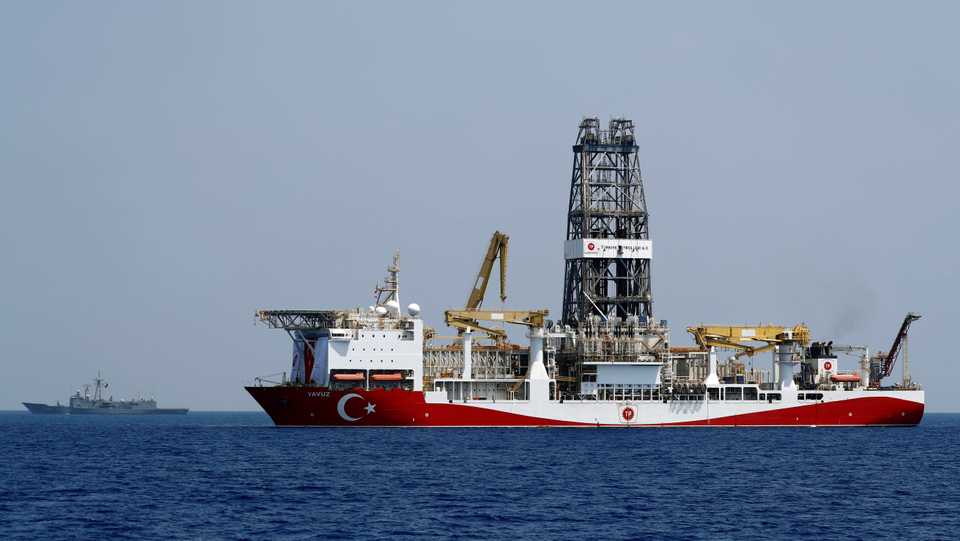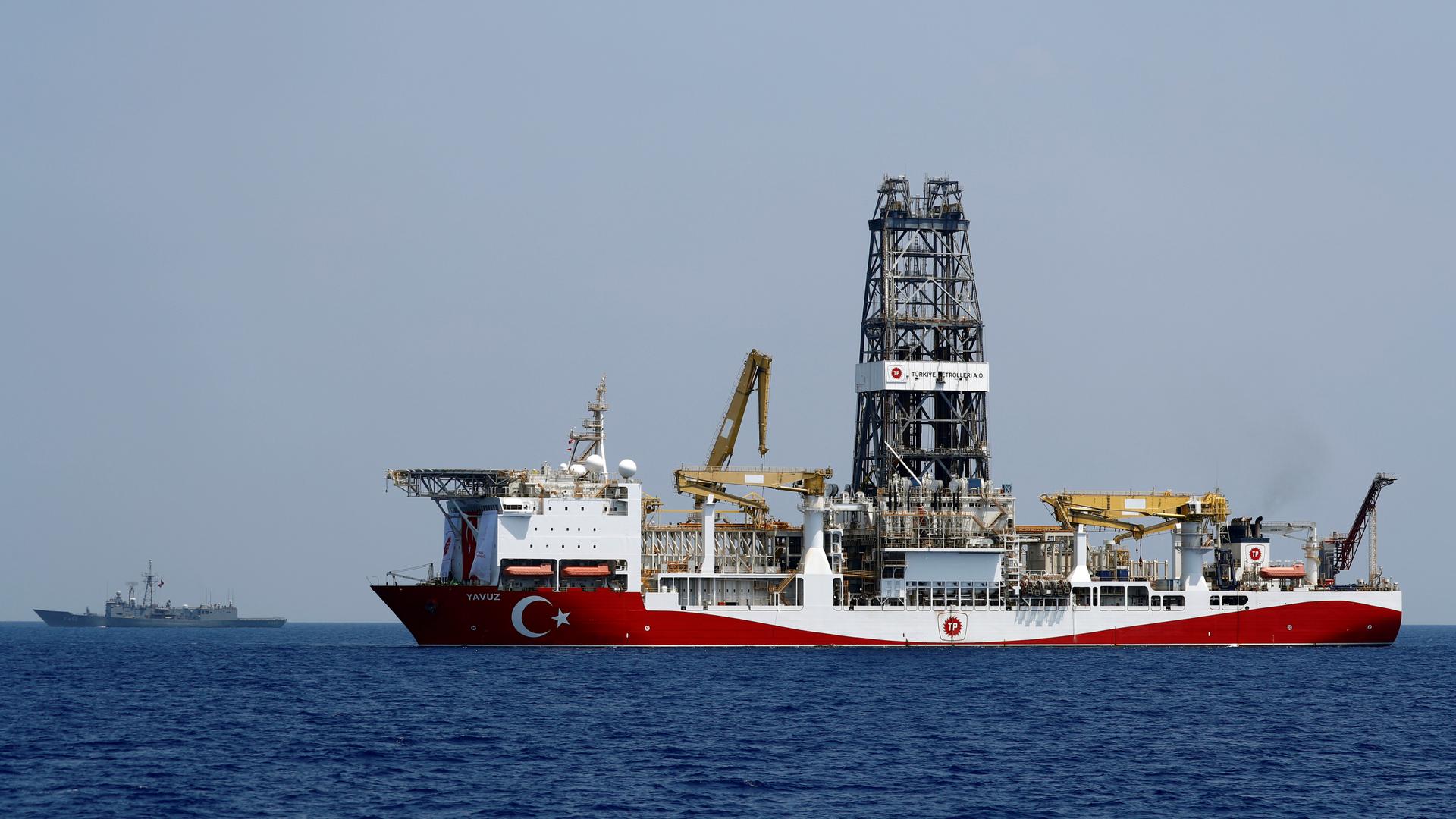
The sixth generation ultra-deepwater drillship, Yavuz, has started its operations at the Karpaz-1 well located in the Bay of Gazimagusa, also known as Famagusta, in the Turkish Republic of Northern Cyprus (TRNC).
“As of today, we reached a drilling depth of 1,710 metres. We have a 2.5-3 month program here,” Fatih Donmez, Turkey’s energy and natural resources minister said, following his visit to the Yavuz drilling ship on Tuesday with Turkish Cypriot Prime Minister Ersin Tatar and Economy and Energy Minister Hasan Tacoy.
He expressed his hope that when they reach the target depth, they would find natural gas resources.
From spring onwards when Ankara sent two drilling vessels — the Fatih and the Yavuz — to the eastern Mediterranean, work has been ongoing while asserting the right of Turkey and the Turkish Republic of Northern Cyprus (TRNC) to the resources of the region.
“The Yavuz drilling ship is the latest in our fleet, while the Fatih drilling vessel also continues to conduct its operations in the western part of the island,” Donmez said.
Turkey’s first seismic vessel, the Barbaros Hayrettin Pasa, bought from Norway in 2013, has been conducting exploration in the Mediterranean since April 2017.
“In August, our second seismic vessel, the MTA Oruc Reis, will also be sent to the Mediterranean. So we will continue to do our research and drilling activities in the Mediterranean with the two seismic and the two drilling vessels,” Donmez said.
Turkey says its two drill ships are continuing operations in the eastern Mediterranean. We report from on board the Yavuz drill vessel pic.twitter.com/TxaiCwnTuG
— TRT World Now (@TRTWorldNow) August 7, 2019
The MTA Oruc Reis has been conducting seismic surveys in the Black Sea and Marmara since August 2017.
Athens and the Greek Cypriot administration have opposed Turkey’s move in the Mediterranean, and have threatened to arrest the ships’ crews and have enlisted EU leaders to also condemn Turkey’s activities.
Underlining Turkey’s strong support for the rights of the Turkish people living in the TRNC, Donmez said the TRNC government last month suggested forming a cooperation mechanism for joint exploration and profit-sharing of hydrocarbon resources around the island of Cyprus. However, this suggestion was rejected by the Greek Cypriot administration.
“Once more I would like to say that the gathering of the two sides with the aim of reevaluation of this proposal will be for the benefit of all sides. And once more I would like to say that we are ready to support this meeting as a guarantor country,” Donmez asserted.
Turkish Cypriot Prime Minister Ersin Tatar said that Turkey’s decisive stance is crucial for the protection of Turkish Cypriots’ rights and interests in the east Mediterranean.
“We would like to thank the Turkish government once more because it is not easy to conduct these very high-cost activities,” he said.
TRT World’s Andrew Hopkins has more.
TRNC has no expectations in new Cyprus talks
Even as the leaders of Turkish and Greek Cypriot are scheduled to meet on August 9, the foreign minister of the Turkish Cypriot administration on Wednesday said, he does not expect any headway towards a comprehensive solution.
“There will be a meeting, where some issues on trust building will be discussed, but there will not be any progress towards a comprehensive solution,” Turkish Republic of Northern Cyprus (TRNC) Deputy Prime Minister and Foreign Minister Kudret Ozersay told Anadolu Agency.
“The TRNC administration favours taking some steps. Some steps have been taken regarding the future of the Closed Maras region. The Greek Cypriot administration should not be included in this region, but they would probably demand their inclusion,” said Ozersay, while referring to Greek Cyprus’s obstructive role on the Closed Maras — or Varosha in Greek — issue.
Maras is the southern quarter of the Cypriot city of Famagusta under the control of the TRNC. He said that the region can be turned into a civilian place from the military area.
The TNRC has already announced the opening of Maras to tourists.
Rights of Turkish Cypriots
Speaking to Turkish ambassadors in Ankara on Tuesday, President Recep Tayyip Erdogan said Turkey would continue to protect the rights of Turkish Cypriots.
“We cannot remain indifferent to the attempts at theft and sabotage that are being carried out under the name of drilling,” he said.
Turkey has consistently contested the Greek Cypriot administration’s unilateral drilling in the eastern Mediterranean, asserting that the TRNC also has rights to the resources in the area.
In 1974, following a coup aiming at Cyprus’s annexation by Greece, Ankara had to intervene as a guarantor power. In 1983, the TRNC was founded.
The decades since have seen several attempts to resolve the Cyprus dispute, all ending in failure. The latest one, held with the participation of the guarantor countries — Turkey, Greece and the UK — came to an end without any progress in 2017 in Switzerland.










Discussion about this post